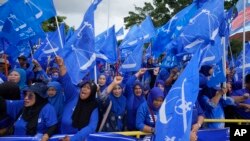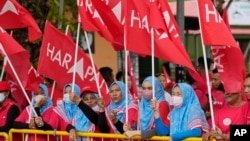A three-way race to form Malaysia’s next government is proving too close to call just days out from Saturday’s national elections, in a contest experts say may shape the course of the country’s nascent fight against top-tier corruption.
The incumbent Barisan Nasional, a coalition of parties led by the United Malays National Organization, is aiming to build on its slim parliamentary majority with a message of “stability and progress” after more than two years of political and economic turmoil.
UMNO is also hoping to overcome a whirlwind of corruption scandals that saw former Prime Minister and party President Najib Razak begin a 12-year jail term in August for his role in the estimated $4.5 billion looting of state development fund, 1MDB. Several other Barisan officials, including current UMNO President Ahmad Zahid Hamidi, are facing dozens of corruption charges as well.
Najib and Ahmad Zahid both deny any wrongdoing, and their party remains popular with many of the country’s majority Muslim ethnic Malays.
UMNO led Malaysia for over six decades, from the country’s independence from Britain in 1957 until Barisan’s surprise defeat at the polls in 2018, then elbowed its way back to power through a series of shifting alliances in Parliament. By establishing an array of affirmative action programs for the country’s ethnic majority, the party is for some still the premier champion of Malay interests.
“It’s been around for so long, these kinds of outlooks are deeply engrained, and those loyalties remain,” said William Case, a social science professor at the University of Nottingham-Malaysia.
“They’re weakened,” he added, “but ... it’s still intact to some extent.”
Watch related video by Dave Grunebaum:
Barisan’s main rival for the Malay Muslim vote is Perikatan Nasional, another pro-Malay coalition co-led by Bersatu and the Islamist Muslim Islamic Party, known as PAS, which supports Sharia law.
The latest published survey results from the Merdeka Center, Malaysia’s most widely cited polling agency, show 13% of respondents preferring Perikatan, well behind the 24% leaning toward Barisan. But Merdeka Center director Ibrahim Suffian told VOA this week that Perikatan seemed to be gaining ground.
For many ethnic Malays and conservative Muslims, Case said, Perikatan offers the benefits of Barisan with more Islam and minus the scandals.
“You get the Malay protection, you get the more intense Islamization, without all the corruption and baggage that goes along with it,” he said.
Analysts say the two blocs are likely to split much of the Malay vote in an echo of 2018, when a divided UMNO and PAS allowed the progressive Pakatan Harapan coalition, drawing heavily on Malaysia’s sizeable ethnic Chinese and Indian minorities, to surge ahead and unseat Najib.
With Pakatan in power, Malaysia’s courts soon launched the corruption cases now besetting Barisan but infighting among the bloc’s disparate parties ultimately brought its own government down in early 2020.
The Merdeka Center’s last survey shows Pakatan, led by longtime opposition figure Anwar Ibrahim, once again in the lead with 26% support from those polled, making it the third bloc in this year’s three-way race. But with none of the three looking likely to win the simple majority of seats in Parliament needed to claim victory, Ibrahim said the race remains wide open.
Muhamad Nadzri Mohamed Noor, who heads the National University of Malaysia’s political science program, said that is likely to mean a hung parliament on Saturday and hours, if not days, of negotiations as the blocs try cobbling together a winning majority by teaming up.
The analyst said Barisan and Perikatan, the two main pro-Malay blocs, make for the most likely pairing, with incumbent Prime Minister and UMNO stalwart Ismail Sabri Yaakob getting first crack at forming the next government from Malaysia’s constitutional monarch, Al-Sultan Abdullah.
Muhamad Nadzri and Case said many Malaysians are worried a resurgent UMNO back in power could start chipping away at the judiciary’s fight against high-level graft.
Case recalled a meeting early last month at which Ahmad Zahid, caught on camera, anxiously warned fellow Barisan members that they too could find themselves in court if their bloc were to lose power once more.
“It was just an amazing moment that has attracted a great deal of comment and encourages the belief that one of the chief motivations behind calling this election was the hopes of top officials at UMNO that they can win, regain their sway over the state apparatus and rein in the judiciary and stop these court proceedings against them. That’s the widespread suspicion,” he said.
Muhamad Nadzri said whether that comes to pass will rest in large part on how many seats Barisan wins if it does manage to hold on to power. Fewer seats, he said, will force it into making more concessions to officials in Perikatan, and maybe even Pakatan, who want to see the graft cases proceed.
“As long as it needs the support from other coalitions, especially [Perikatan] and [Pakatan], there will still be check and balance,” he said.
Ibrahim said much may also depend on what is expected to be an outsized youth vote this year.
Malaysia lowered the voting age from 21 to 18 in 2019, a move that added 1.8 million to Malaysia’s pool of eligible voters, about 8% of the country’s total.
Watch related video by Dave Grunebaum:
The Merdeka Center director said recent surveys suggest those young voters will generally cast their ballots for parties aligning with their ethnicity in similar proportions to their elders — but not quite. He said younger voters are more likely to put their economic concerns ahead of identity or party loyalty, and made up a disproportionate share of the 31% who told the center’s pollsters they were undecided as of late October.
“It opens up an opportunity for opposition parties to reach out and improve their vote share. It also forces the ruling party to be more agile, to be more adaptive to younger people’s needs,” said Ibrahim.
With so many votes still possibly up for grabs in such a tight field, he added, “I think it’s a situation where it could be anyone’s [race] right now.”









